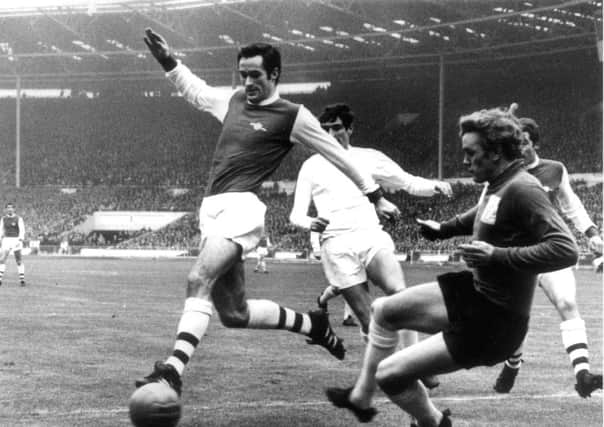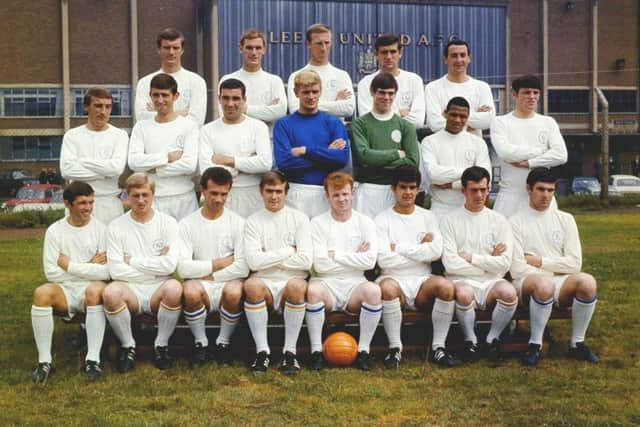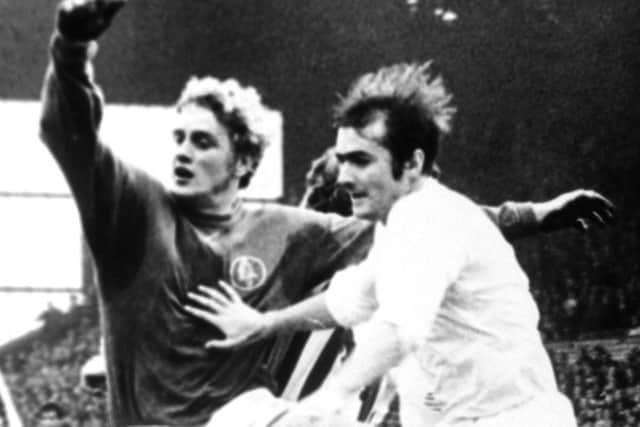How 1968 League Cup Final win spawned a legacy of Leeds United legends


It was, says Norman Hunter, a simple matter of time, and confidence like his is a reason why Leeds United went through the gears so dramatically in the 1960s.
Tomorrow marks 50 years since a seminal moment in the club’s history, their first major trophy after half-a-century of trying and the start of Don Revie’s roll of honour.
Advertisement
Hide AdAdvertisement
Hide AdThere were notable achievements before 1968 – two second division titles and defeats in the finals of both the FA Cup and Inter-Cities Fairs Cup – but in that year it clicked. A League Cup victory on March 2 preceded the lifting of the Fairs Cup two months later, liberating Leeds from the role of the bridesmaid. Left-back Terry Cooper, whose volley won the League Cup, said a 1-0 defeat of Arsenal at Wembley was akin to “breaking the ice as regards winning something. Our side wasn’t far off its peak then. All the players were there.”
Hunter, the breeze-block defender who played to Cooper’s right, felt less impatient than that. The League Cup final was a dream realised, a trophy claimed at Wembley, but Revie’s squad had the best part of a decade ahead of them. “I don’t think it ever crossed my mind that we wouldn’t win anything,” Hunter said. “Quite the opposite really. Every season we set out to win everything, no more or less than that, and sometimes it was our downfall: fighting in Europe, fighting for cups, going for the league. The ambition was total.
“But we’d knocked on the door a couple of times and you had to start somewhere. That’s how it felt to me. You got the League Cup medal in your pocket and after that you were thinking ‘what’s next?’ Well, the Fairs Cup came next a couple of months later. I think that makes the point.”
Leeds’ experience of the FA Cup final in 1965 had not been especially pleasant. Beaten 2-1 in extra-time by a very late header from Ian St. John, the game was criticised as a spectacle and lacked the spark expected of two of Division One’s stronger teams. Billy Bremner kept Leeds in it with an equaliser in the 100th minute but Hunter, who was then 21, saw inexperience play its part.
Advertisement
Hide AdAdvertisement
Hide Ad“If we’d had more know-how or a bit more about us we’d have won that final,” he said. “Maybe it was a bit too soon or maybe Liverpool just had that little bit on us. By the time we got round to the League Cup final, we’d grown up a bit more. It was our time and we were getting better as a team. It’s hard to measure confidence but we went into that final expecting to win it.”


Leeds had eased into the last four by beating Luton Town, Bury, Sunderland and Stoke City and conceding only one goal. Brian Clough’s Derby County were seen off over two legs of a competitive semi-final, setting up a Wembley date with Bertie Mee’s Arsenal. The Gunners were dipping into a mid-table position in Division One but had the core of a strong team: George Graham, Frank McLintock, Ian Ure and Peter Storey. “I had them down as a good side,” Hunter said, “but I had more belief in the players around me.”
Revie spoke before the final of seeking a reward for “four years of hard toil and sweat” after Leeds’ promotion from the second division in 1964. The League Cup was a fledgling tournament, established by the Football League in 1960, and Wembley had hosted the final for the first time in 1967 but it was not seen by Revie as a secondary tournament or a lesser priority.
“We never had priorities,” Hunter said. “If you were in a tournament you were winning it or trying your damndest to win it. It’s different now, especially in the early rounds. It’s almost like the League Cup’s a nuisance. But I watched Manchester City winning it last weekend, the way they reacted and the fact that the coach (Pep Guardiola’s) got his first trophy, and you could tell that it mattered.
Advertisement
Hide AdAdvertisement
Hide Ad“Winning a trophy at Wembley was the pinnacle. Okay, when I was young that meant winning the FA Cup but the League Cup seemed just as important. It was just as important to me. When I look back at all the things that side won, nothing matters more or less.”


Hunter’s description of the final against Arsenal is to say that it “wasn’t a classic”; a view which reflects media coverage at the time.
The game was light on chances, other than a deft finish from Cooper in the 20th minute, and niggly throughout, leading to one goalmouth scuffle in which fists began to fly after McLintock barged into Gary Sprake. Sprake called it handbags but the antipathy felt real. “You could say that about a lot of our games,” Hunter joked. “Niggly was how football was back then. The game was there to be won and we all got stuck in.
“It wasn’t a classic, I’ll happily admit, but then not too many finals are. Everything comes down to the result on the day and even though you’ve got 100,000 people watching you, you’d be stupid to showboat or to try and be clever for their sake. You do the right things, the sensible things, and you win the game. The winners go down in the record books.”
Advertisement
Hide AdAdvertisement
Hide AdCooper’s goals in 13 seasons at Leeds did not reach double figures but his finish at Wembley, the only goal of the game, was driven past Jim Furnell from 14 yards on the rebound from a corner. Cooper called it “the kind of effort that either hits the corner flag or flies into the roof of the net”. “He didn’t score many,” Hunter said, “but he couldn’t have hit that better. It was a sweet strike.”


Arsenal were angered by Jack Charlton challenging their goalkeeper on the line as Furnell tried to catch a hanging delivery, forcing the ricochet which Cooper tucked away. “It was never a foul,” Hunter said. “Not in them days. Although I’m sure the Arsenal players would tell you differently.”
Arsenal’s chances were few and as time ticked on, Revie was mindful of preventing another trophy from slipping away. Paul Madeley dropped deep and Rod Belfitt, a supporting member of the more renowned Revie cast, finished alone up front after replacing the injured Eddie Gray. Arsenal were dispatched with only a slight scare when Sprake dived to turn John Radford’s shot wide.
United took the cup but, true to form, had little time to reflect. There was much left in front of Revie’s squad: a chance of the title, a last-four meeting with Everton in the FA Cup and a Fairs Cup semi-final against Rangers.
Advertisement
Hide AdAdvertisement
Hide Ad“There’s no doubt it was a big deal,” Hunter said. “It was a big deal to us players but also to the club, the first big trophy they’d won.
“You felt the importance of that and it was a very special day but I wasn’t one for relaxing. None of us were. For me it was never about whether we could win a trophy. It was about how many we could win.” Revie and his players did not look back.